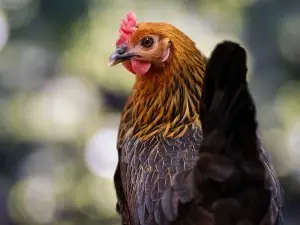
Chickens are animals who enjoy being active, getting things done, and interacting with other chickens.
If you notice that your bird is hunched up and has it’s tail down you’d be right to be worried. This article looks into why this happens.
Table of Contents
Chicken hunched up tail down:
If you notice that your bird isn’t its typical perky self you’d likely be very surprised and concerned, and you should be.
The reason why your bird may be acting like this is that the bird may be egg-bound. This can be a traumatic experience for both the bird and for you, but fear not, there is something you can do:
What is egg binding?
When someone says a chicken is egg bound this simply means that there is an egg stuck in the chicken and the egg can’t come out even though the bird tries to push it out.
The egg will be stuck in the last portion of the bird’s reproductive tract, somewhere in her oviduct, just before the egg comes out of the vent. The egg will usually be between the uterus and the cloaca.
What causes egg binding?
When a chicken lays an egg the egg is laid with the blunt side coming out first. While in the body, the egg is facing the pointy side first.
The egg turns to face the correct position as it gets closer to being laid but the egg can get stuck while turning and cause egg binding.
Egg binding can also happen if the bird has a lack of calcium in its body, if the bird is too obese to turn the eggs, if the bird has an infection, if the egg is malformed, if the bird is under a lot of stress, if the bird has worms, if the bird is too young to be laying eggs but is forced to, egg binding can be genetic and it can happen if the bird holds the egg while waiting for the next box to open up.
Other signs of egg binding:
Egg binding comes with other symptoms as well, not only will an egg-bound chicken be hunched up with its tail down, other symptoms will also show up.
Your chicken may hide symptoms of illnesses very well but there are some symptoms that can’t be hidden, other signs of egg binding include:
- The bird eating less
- Lethargy
- Waddling
- No poop or very wet poop
- Tail pumping
- Shaking
What to do:
Thankfully, egg binding does not have to be treated at a vet if you catch it early enough. You can treat an egg-bound chicken at home. This is what to do:
Figure out if there is a stuck egg:
You’d need to give the bird a physical exam to determine whether the egg is actually stuck.
To do this, place the bird under your arm, having it look backward. Wear a latex glove and liberally cover your finger with Vaseline.
Gently insert your index finger into the bird’s vent in a slightly upwards and straightforward direction.
If there is an egg stuck in your bird then you’ll feel the egg by the time your finger is 2 inches deep in the bird. If you have to go any further than this then there is likely no egg in the bird.
Soak the bird:
If there is an egg stuck in the bird then you can run a bath for your bird and soak her in it, this will help relax the bird’s muscles and help the bird pass the egg.
Fill a container with half a gallon of warm water and add half a cup of Epsom salts to the water. Let your bird sit in this bathwater making sure that her abdomen is immersed.
Don’t worry if the bird struggles in the beginning, the bird will eventually settle down. Leave the bird in the bath for 20 minutes.
If the egg hasn’t passed once the 20 minutes are up then you can take her out of the bath, dry her off and keep her somewhere secluded where she can relax away from the flock.
Lubricating the vent using Vaseline or vegetable oil will help the egg slide out.
Check her every hour to see if she passes the egg. If she doesn’t pass the egg repeat this process 3 or 4 times. If she still doesn’t pass the egg then you’d need to contact your vet and have them remove the egg.
If you enjoyed this article then you may also be interested in other chicken related articles. Here are some articles that you may be interested in: Chicken Walking Low On Ground, Chicken Lifting Legs High When Walking, Chicken Walking Sideways

